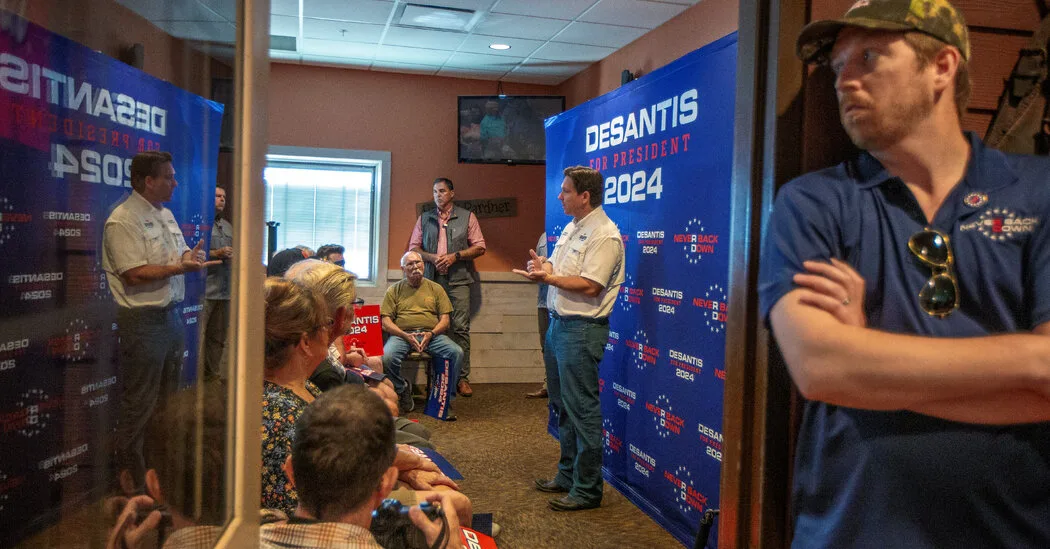
As Donald J. Trump has escalated his attacks on the justice system and the “deep state,” his competitors for the Republican nomination have followed his lead.
Ron DeSantis says the military is more interested in global warming and “gender ideology” initiatives than in national security.
Tim Scott says the Justice Department “continues to hunt Republicans.”
Vivek Ramaswamy has vowed to “shut down the deep state,” borrowing former President Donald J. Trump’s conspiratorial shorthand for a federal bureaucracy he views as hostile.
As Mr. Trump escalates his attacks on American institutions, focusing his fire on the Justice Department as he faces new criminal charges, his competitors for the Republican nomination have followed his lead.
Several have adopted much of Mr. Trump’s rhetoric sowing broad suspicion about the courts, the F.B.I., the military and schools. As they vie for support in a primary dominated by Mr. Trump, they routinely blast these targets in ways that might have been considered extraordinary, not to mention unthinkably bad politics, just a few years ago.
Yet, there is little doubt about the political incentives behind the statements. Polls show that Americans’ trust in their institutions has fallen to historic lows, with Republicans exhibiting more doubt across a broad swath of public life.
The proliferation of attacks has alarmed both Republicans and Democrats who worry about the long-term impact on American democracy. Public confidence in core institutions — from the justice system to voting systems — is fundamental to a durable democracy, particularly at a time of sharp political division.
“We’ve had these times of division before in our history, but we’ve always had leaders to bridge the gaps who have said we need to build respect, we need to restore confidence in our institutions — today we have just the opposite,” said Asa Hutchinson, the former governor of Arkansas and a moderate whose campaign for the Republican presidential nomination has so far gained little traction.
“That defines the course of 2024. We’re going to have a leader that brings out the best of America, which is the first job of being president. Or you’re going to have somebody that increases distrust that we have in our institutions.”
Mr. Trump is still the loudest voice. As he blames others for his defeat in 2020 and, now, after being charged in three separate criminal cases, he has characterized federal prosecutors as “henchmen” orchestrating a “cover-up.” After he was indicted last week on charges related to his attempts to overturn the election, his campaign cited “abuse, incompetence, and corruption that is running through the veins of our country at levels never seen before.”
Mr. DeSantis, however, has echoed that view, making criticisms of educators, health officials, mainstream media, “elites” and government employees central to his campaign, and even, at times, invoking violent imagery.
“All of these deep state people, you know, we are going to start slitting throats on Day 1,” Mr. DeSantis said during a New Hampshire campaign stop late last week. The governor, a Navy veteran, used similar language about the Department of Defense late last month, saying that if elected he would need a defense secretary who “may have to slit some throats.”
Other candidates, too, have keyed into voters’ trust deficit. Mr. Ramaswamy, a biotech entrepreneur, wants to shut down the F.B.I. and the I.R.S. as part of his fight against the deep state. Nikki Haley, a former South Carolina governor and ambassador to the United Nations, has said she opposes red-flag gun laws because “I don’t trust that they won’t take them away from people who rightfully deserve to have them.”
Even Mike Pence, who has criticized Mr. Trump’s plot to overturn the 2020 election at the heart of the charges filed late week, has suggested the Justice Department is politically motivated in its prosecution, warning of a “two-tiered system of justice,” with “one set of rules for Republicans, and one set of rules for Democrats.”
Running against the government is hardly new, especially for Republicans. For decades, the party called for shrinking the size and reach of some federal programs — with the exception of the military — and treated President Reagan’s declaration that “government is the problem” as a guiding principle.
But even some Republicans, largely moderates who’ve rejected Trumpism, note the tenor of the campaign rhetoric has reached new and conspiratorial levels. Familiar complaints about government waste or regulatory overreach are now replaced with claims that government agencies are targeting citizens and that bureaucrats are busy enacting political agendas.
“Does anyone believe the IRS won’t go after Middle America?” Nikki Haley tweeted in April.
None of the candidates responded to requests for interviews about these statements.
Casting doubt on the integrity of government is hardly limited to Republican candidates. Robert F. Kennedy Jr., a long-shot candidate for the Democratic nomination, has made questioning public health officials on long-established science a focus of his campaign. In her quixotic bid for the nomination, Marianne Williamson has declared that she is “running to challenge the system.”
And President Biden, whose resistance to institutional change has often frustrated the left wing of his party, has mused about his skepticism of the Supreme Court — “this is not a normal court,” he said, after the court’s ruling striking down affirmative action in college admissions.
A Gallup poll released in July found that public confidence in major American institutions is at record low levels, with historic levels of distrust in the military, police, schools, big business and technology. Several other institutions — including the presidency, the Supreme Court and the criminal justice system as well as newspapers and broadcast news, are just slightly above the record low they hit last year.
There is an unmistakable partisan divide: Republicans are far less likely to express confidence in a majority of institutions in the survey, including the presidency and public schools. Democrats have far more doubt about the Supreme Court and the police. (There is bipartisan distrust in the criminal justice system, with less than one in four voters expressing confidence in the system.)
The military has seen an especially steep decline in trust from Republican voters, with 68 percent saying they have confidence in the armed forces, compared with 91 percent three years ago. Mr. DeSantis in particular has spoken to that shift on an institution that Republicans were once loath to criticize.
“When revered institutions like our own military are more concerned with matters not central to the mission — from global warming to gender ideology and pronouns, morale declines and recruiting suffers,” he said when he announced his bid. “We need to eliminate these distractions and get focused on the core mission.”
In a Fox News interview, he recently said, “The military that I see is different from the military I served in.”
Feeding on voters’ already deeply embedded skepticism might have once been seen as politically risky, but social media and the right-wing media have helped change that, said Sarah Longwell, a Republican consultant who conducts weekly focus groups with her party’s voters.
Ms. Longwell says these forces have crated a “Republican triangle of doom,” with the party’s voter base, politicians and partisan media creating a feedback loop of complaints and conspiracy theories.
“The lack of trust has become a defining feature of our politics,” she said. “Voters feel like there is an existential threat any time that someone who doesn’t share your politics is in charge of something. We’ve lost the sense that neutral is possible.”
But that does not explain the whole picture. The public’s trust in government institutions has been slipping for decades, first declining in the wake of the Vietnam War and then again after Watergate and yet again after the war in Iraq and the Great Recession.
Former Gov. Jerry Brown of California noted that he ran for the Democratic nomination for president in 1992 by attacking Washington institutions as corrupt, but the argument never caught fire in the way it has with Republicans, he said, in part because his party’s base generally trusted government.
Today he sees the country as more polarized. Notions that would have once been seen as being on the fringe, such as Mr. Trump’s false claims that the 2020 election was stolen, are mainstream. Many Republican voters expect to hear candidates attack elections results routinely, undermining the system they depend on for power.
“Democracy does depend on trust,” even if “politics depends on fear,” Mr. Brown said in a recent interview. “The world is getting more dangerous, and at home it’s getting less governable.”
The impact of the lack of trust was particularly apparent in the pandemic, when many Americans blamed public authorities for inconsistent guidance and unpopular lockdowns. Ultimately, that distrust fed the anti-vaccination campaigns.
Questioning public health officials has been essential to the rise of Mr. DeSantis, who more than two years ago wrote an essay in The Wall Street Journal, with the headline: “Don’t Trust the Elites.”
Mr. Ramaswamy, a biotech entrepreneur, has also taken aim at the government. In another era, he might have been an unlikely hero for the anti-establishment — a Harvard-educated businessman who has lent more than $15 million to his own campaign.
Still, as the disdain for the elites has metastasized deeper and further into the party, Mr. Ramaswamy has embraced the pugilistic language of Mr. Trump, frequently on social media.
“Shut down the FBI & IRS,” he posted earlier this month. “Pardon defendants of politicized prosecutions. Replace civil service protections with 8-year term limits. Punish bureaucrats who violate the law. Get aggressive.”
Kitty Bennett contributed research.


